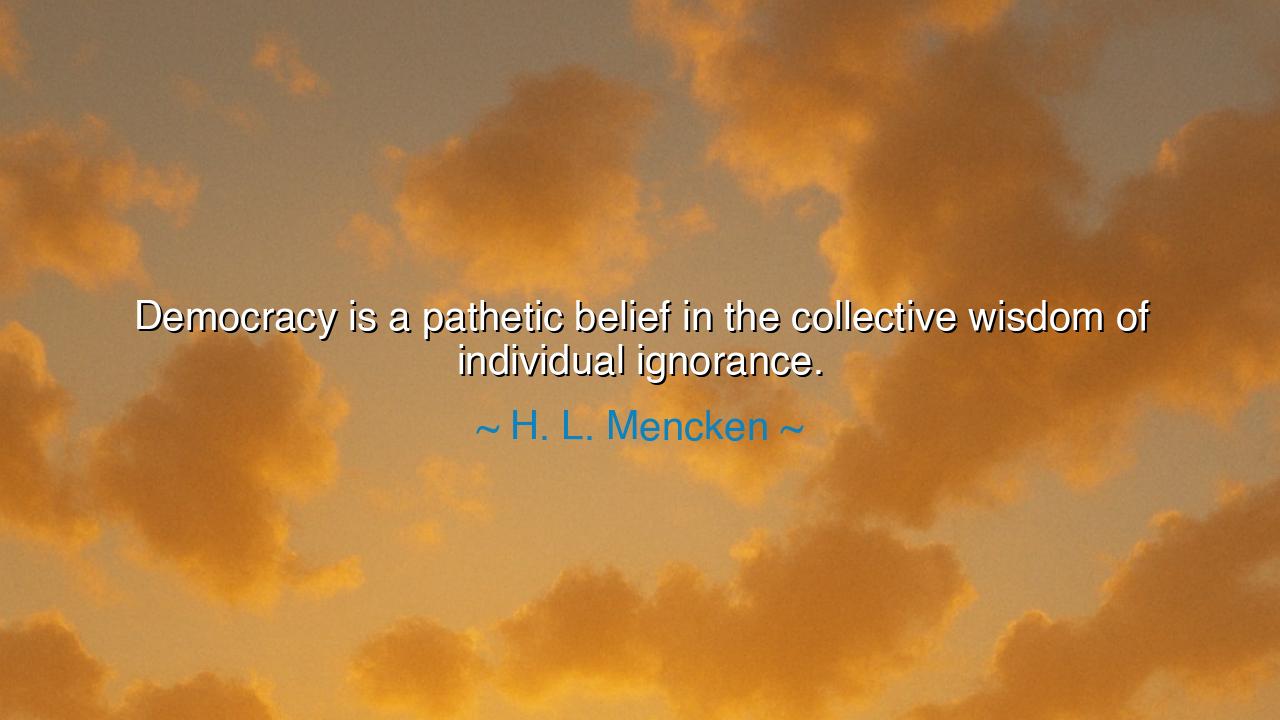
Democracy is a pathetic belief in the collective wisdom of






In every age, men and women have sought to shape their destinies through the structures of governance. Among these, democracy has often been hailed as the highest form of rule, a system where the voice of the people is sovereign. Yet H. L. Mencken, sharp of tongue and unafraid of controversy, declared with biting candor: “Democracy is a pathetic belief in the collective wisdom of individual ignorance.” His words pierce like a blade, challenging the very foundations of popular rule and warning of the chaos that arises when decisions are made by the many without true understanding.
At its heart, Mencken’s quote reveals a painful paradox. Democracy rests on the hope that while each individual may be flawed and uninformed, the sum of their choices will lead to wise governance. Mencken saw this as pathetic, a fragile faith easily shattered by reality. When the multitude votes not with knowledge but with passion, prejudice, and misinformation, their collective wisdom may be nothing more than a louder form of individual ignorance. Thus, democracy can devolve into rule by emotion rather than reason, by impulse rather than vision.
History offers sobering examples of this danger. In ancient Athens, birthplace of democracy, the people were swayed by silver-tongued demagogues who stirred their emotions for personal gain. It was the Athenian assembly, driven by fear and rage, that condemned Socrates, one of the wisest men of his age, to death. Here, the so-called collective wisdom of the many became an instrument of injustice. This tragedy stands as a timeless reminder that the crowd, when untethered from truth, can become as dangerous as any tyrant.
Yet Mencken’s warning is not only for the ancients. In modern times, propaganda and manipulation have shown how easily the masses can be misled. The rise of Adolf Hitler in Nazi Germany was not solely the work of a single madman, but of millions who placed blind trust in lies and hatred. In this, Mencken’s words find haunting confirmation: the ignorance of individuals, when combined and magnified, can unleash devastation on a global scale. The ballot, though peaceful in appearance, can be as destructive as the sword if wielded without discernment.
Let this teaching echo through the corridors of time: democracy is not inherently evil, but it is perilously fragile. Its strength depends not on the sheer number of voices, but on the wisdom and virtue of those who speak. Mencken’s words are a challenge to all who live under freedom: do not be content with ignorance, for the fate of nations rests on the understanding of their citizens. Seek truth, cherish reason, and rise above the passions of the crowd, lest the dream of liberty dissolve into the nightmare of collective folly.






TKLe the khai
This makes me question the tension between individual agency and societal outcomes. If people are largely uninformed, how much responsibility should they bear for the state of governance? Conversely, does this pessimistic view risk undermining participation altogether? I wonder whether Mencken’s critique is a call for education and empowerment or simply a fatalistic judgment. Could the collective still achieve wisdom through structured deliberation and collaboration, despite individual ignorance?
DNLe Dang Nhat
I find this quote deeply unsettling but thought-provoking. It challenges the idealistic notion that democracy guarantees wise governance. Does Mencken’s point imply that leaders are only as informed or capable as the electorate allows, and therefore the system is fragile? I’m curious how this critique applies to varying political contexts—do some democracies succeed better than others in mitigating collective ignorance, or is it a universal limitation?
KKNguyen Kim Khanh
This perspective feels harsh yet oddly insightful. It suggests that even well-intentioned systems are vulnerable to human limitations. Does this mean that representative democracy, checks and balances, or advisory institutions are just superficial attempts to fix an unfixable problem? I also wonder how this critique holds up in modern times, with social media and information overload. Can the collective judgment of individuals ever be trusted in practice, or is it inherently flawed?
BTBao Tran
Reading this, I feel a mix of amusement and unease. It seems to imply that collective decision-making is inherently flawed because individuals are uninformed. But does this dismiss the value of debate, diversity of opinion, or compromise? I’m curious whether Mencken believed democracy could be improved through better education or civic engagement, or if he considered it fundamentally doomed to mediocrity.
DDDinh Diep-Jolie
This statement feels both cynical and provocative. It makes me question whether the frustrations I sometimes feel with political systems are natural or systemic. Are we really overestimating the wisdom of the masses, or is it just that the tools and education for informed decision-making are inadequate? I wonder if Mencken is critiquing democracy itself or the conditions in which it operates. Can a society ever achieve true collective wisdom?